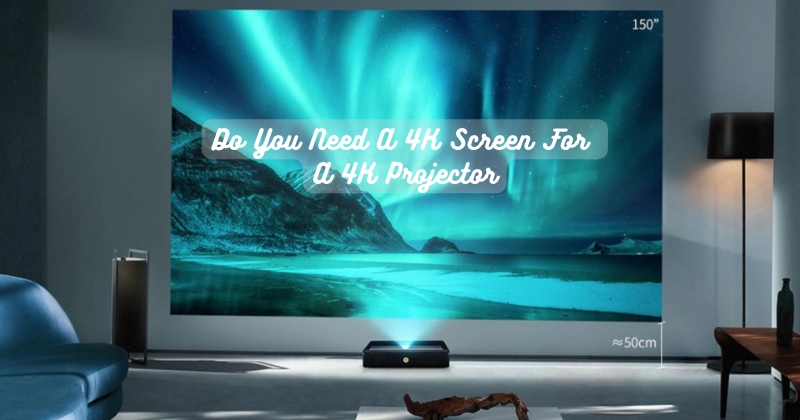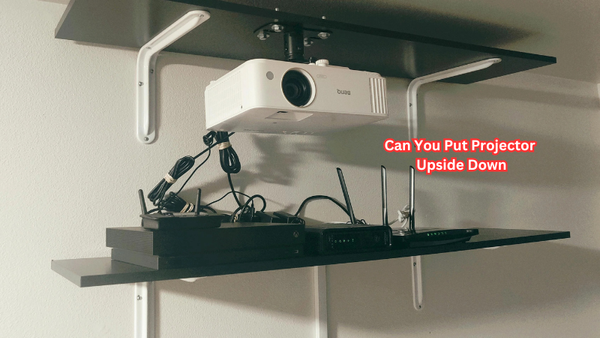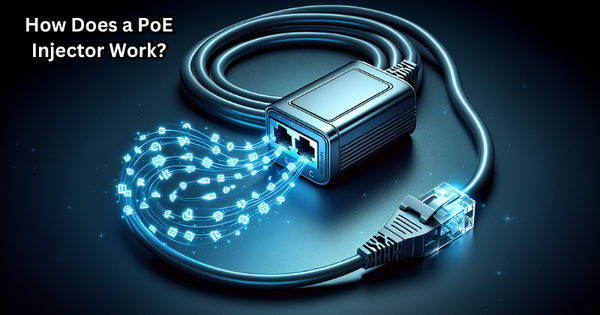Are you considering purchasing a 4K projector but wondering if you need to invest in a 4K screen, too? The answer might surprise you.
While having a 4K screen can enhance your viewing experience, it is not an absolute necessity for enjoying the benefits of a 4K projector. A 4K projector is designed to deliver stunningly detailed and vibrant imagery by producing an ultra-high resolution of 3840 x 2160 pixels. However, even when paired with a regular HD screen, the difference in image quality and clarity will still be noticeable compared to a standard HD projector.
In this introduction, we will explore the advantages and considerations of using a 4K screen with a 4K projector, helping you decide on your home theater setup.
What Is 4K Technology?
Let's first understand what 4K means. Simply put, 4K is a term used to describe the horizontal resolution of an image or display. For a display to be considered 4K, it must have a minimum resolution of 3840 x 2160 pixels. This means there are approximately four times more pixels on a 4K screen than a standard HD screen, resulting in a sharper and more detailed image.
Plus, with advancements in technology, even higher resolutions are now available, such as 8K and beyond. However, for this discussion, we will focus on the widely available 4K projectors and screens. High-gain screen materials, HDR (High Dynamic Range), and advanced color technologies are often associated with 4K projectors, further enhancing the viewing experience.
Is Your Projector Truly 4K?
Before we delve into the necessity of a 4K screen, it is important to ensure that your projector can produce true 4K resolution. Some projectors may claim to be 4K, but upon closer inspection, they may use pixel shifting or upscaling techniques to achieve this resolution. While these methods can still provide a high-quality image, it may not be 4K. Projection setup and image calibration also play a crucial role in achieving the best possible 4K picture.
4K projectors are expensive investments, so it is important to do thorough research and consult with experts to ensure you are getting the true 4K experience. Price, brand reputation, and features such as lens shift, throw distance, and brightness should also be taken into consideration when purchasing a 4K projector. True 4K projectors use DLP or LCD chips to create the images, while pixel-shifting projectors may use 1080p or lower resolution chips and manipulate them to create a 4K image.
Therefore, make sure to thoroughly research the specifications of your chosen projector before making a purchase. Look for phrases such as "native 4K" or "pixel-to-pixel mapping" to ensure that the projector is capable of producing true 4K resolution. Pixel geometry is crucial for achieving a sharp and detailed image, and this can only be achieved with true 4K projectors.
Do You Need A 4K Screen For A 4K Projector?
Now, back to our original question - do you need a 4K screen for a 4K projector? While it may seem like a logical choice to pair a 4K projector with a 4K screen, the reality is that it is not necessary. A 4K projector can still provide a significantly improved viewing experience when paired with a regular HD screen.
In further details, the answer depends on several factors.
Screen Size and Viewing Distance:
The size of your screen and viewing distance play crucial roles in determining the necessity of a 4K screen. Generally, for screens larger than 120 inches or viewing distances closer than 10 feet, a 4K screen is highly recommended to avoid pixilation and loss of sharpness in the image. This is because the individual pixels on a standard HD screen become more apparent at such sizes and distances, resulting in a less detailed and smooth image.
On the other hand, if your screen size is smaller or the viewing distance is farther, a standard HD screen may provide satisfactory results. Screens for overhead projectors, for example, are usually smaller and viewed from a farther distance, making a 4K screen unnecessary.
Ambient Light and Screen Material:
Ambient light can also impact the need for a 4K screen. If your viewing space is well-controlled with minimal ambient light, a standard HD screen may suffice, as it can reflect the projected image without much distortion. However, if your room has windows or other light sources, a 4K screen with high-gain material may be necessary to counteract the potential washout effect caused by ambient light. Ambient lighting conditions should also be considered when selecting a screen material.
Furthermore, HDR technology, which is often associated with 4K projectors, requires a special type of screen material for optimal performance. HDR allows for a wider range of colors and contrast, resulting in a more realistic and immersive viewing experience. A standard HD screen may not be able to fully display the capabilities of HDR, making a 4K screen necessary for this feature.
Personal Preference and Budget:
Ultimately, it boils down to personal preference and budget. If you want the best possible picture quality and have the budget for it, investing in a 4K screen can certainly enhance your viewing experience. However, if you are satisfied with the quality of a standard HD screen and have budget constraints, you can still enjoy the benefits of a 4K projector without a 4K screen.
With that being said, it is important to note that a 4K screen is not just about the resolution but also about the other advanced technologies and features associated with it.
What Screen Is Best for Your 4K Projector?
If you have decided that a 4K screen is necessary for your home theater setup, there are several factors to consider when choosing the right one.
Screen Material and Gain
As mentioned earlier, ambient light and HDR technology play a role in determining the type of screen material needed. High-gain materials such as pearl or silver screens can help counteract ambient light, while matte or white screens are better for a controlled viewing environment.
The screen gain also affects the brightness and contrast of the image, so it is important to choose a gain that best suits your projector's capabilities. Projector screens are available in various gains, with 1.0 being the standard for matte white screens.
Screen Size and Aspect Ratio
Another crucial consideration is the size of your screen and its aspect ratio. It is essential to match your screen's aspect ratio to your projector's aspect ratio; otherwise, you may have black bars on the top, bottom, or sides of your image.
Additionally, leave enough space around your screen for proper sound dispersion and ventilation for your projector. Higher-resolution screens also tend to be larger and more expensive, so consider this when selecting a size. Larger screen sizes can also enhance the immersive experience, but it ultimately depends on personal preference and room size.
Viewing Angle and Screen Type
The viewing angle is also an important factor to consider when choosing a screen type. Some screens are designed for a wider viewing angle, while others are better suited for a narrow viewing angle. Additionally, there are motorized or fixed-frame screens, with each offering different benefits and drawbacks. Compatible screen options for your projector can usually be found in the user manual or by consulting with a professional. Screen surface type is also essential, as it can affect the brightness, contrast, and color accuracy of the projected image.
These are just some of the factors to consider when selecting a screen for your 4K projector. It's not important if you do not have a 4K screen for your 4K projector, but it can greatly enhance your viewing experience and make your investment in a 4K projector well worth it. Cheap screens may offer lower quality images, while higher-end options tend to have better technology and materials for optimal performance.
Benefits of Using a 4K Screen With a 4K Projector
There are several benefits to using a 4K screen with a 4K projector, some of which include:
- Enhanced Image Quality: A 4K screen is specifically designed to display the ultra-high resolution produced by a 4K projector. This means that you will get the best possible image quality and detail without any loss of sharpness or pixilation.
- Better HDR Performance: As mentioned earlier, 4K screens are necessary for optimal HDR performance. With a 4K screen, you can fully experience the wider color gamut and contrast of HDR content.
- Future-proofing: Investing in a 4K screen now will future-proof your home theater setup, as 4K is becoming the standard for content production. This means that you will be able to enjoy a high-quality viewing experience for years to come.
- Increased Viewing Distance: With a 4K screen, you can sit at a farther distance from the screen and still enjoy a clear and detailed image. This allows for more flexibility in room setup and seating arrangements.
- Enhanced Gaming Experience: 4K screens are also great for gaming, as they provide a higher pixel density and smoother graphics for an immersive gaming experience.
Projection screens are an essential component of a home theater setup and can greatly impact the overall viewing experience. While a 4K screen is not necessary for all setups, it offers several benefits that make it worth considering for those with a 4K projector.
FAQs
Are 4K projectors really 4K?
Yes, 4K projectors produce an image with a resolution of 3840 x 2160 pixels or higher. They also offer advanced features such as HDR and wide color gamut for a more realistic viewing experience.
Can you play 1080p on a 4K projector?
Yes, 4K projectors are usually equipped with upscaling technology, which allows them to display lower-resolution content at a higher resolution. However, for the best image quality, pairing a 4K projector with a 4K screen is recommended.
What is the difference between a 1080p and a 4K projector screen?
The main difference is the number of pixels on the screen. A 1080p screen has a 1920 x 1080 pixels resolution, while a 4K screen has a resolution of 3840 x 2160 pixels or higher. This means that a 4K projector can display four times more detail and information than a 1080p projector, resulting in a sharper and more detailed image.
What resolution is a 4K projector screen?
A 4K projector screen has a resolution of 3840 x 2160 pixels or higher. This is four times the resolution of a standard HD screen, which has a resolution of 1920 x 1080 pixels. Projection screen manufacturers also offer screens with even higher resolutions, such as 8K.
Conclusion
In conclusion, while it is not absolutely necessary to have a 4K screen for a 4K projector, pairing the two can significantly enhance your viewing experience. A 4K screen ensures that you are fully utilizing the capabilities of your 4K projector, delivering breathtaking image quality with exceptional detail and clarity. It allows you to immerse yourself in a lifelike and immersive visual experience, especially when watching content that is produced in 4K resolution.
Additionally, investing in a 4K screen future-proofs your setup, ensuring compatibility with upcoming content and potential projector upgrades. The decision ultimately depends on your preferences, screen size, and budget. However, if you want to fully appreciate the true potential of your 4K projector, a 4K screen is a worthwhile investment that can elevate your home theater or viewing space to new heights.





